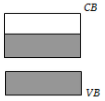If and be the number of electrons and drift velocity in a semiconductor. When the temperature is increased
(1) increases and decreases
(2) decreases and increases
(3) Both and increases
(4) Both and decreases
(1) increases and decreases
The energy gap of silicon is 1.14 eV. The maximum wavelength at which silicon will begin absorbing energy is
(1) 10888 Å
(2) 1088.8 Å
(3) 108.88 Å
(4) 10.888 Å
Which of the following energy band diagram shows the N-type semiconductor
1. 
2. 
3. 
4. 
Which of the energy band diagrams shown in the figure corresponds to that of a semiconductor
1. 
2. 
3. 
4. 
The energy band diagrams for three semiconductor samples of silicon are as shown. We can then assert that
(1) Sample X is undoped while samples Y and Z have been doped with a third group and a fifth group impurity respectively
(2) Sample X is undoped while both samples Y and Z have been doped with a fifth group impurity
(3) Sample X has been doped with equal amounts of third and fifth group impurities while samples Y and Z are undoped
(4) Sample X is undoped while samples Y and Z have been doped with a fifth group and a third group impurity respectively
In a semiconducting material, the mobilities of electrons and holes are \(\mu_e\) and \(\mu_{h}\) respectively. Which of the following is true?
1. \(\mu_{e} > \mu _{h}\)
2. \(\mu_{e} < \mu _{h}\)
3. \(\mu_{e} = \mu _{h}\)
4. \(\mu_{e} <0; ~\mu _{h}>0\)
The temperature (T) dependence of resistivity () of a semiconductor is represented by
1. 
2. 
3. 
4. 
In a forward biased P-N junction diode, the potential barrier in the depletion region is of the form
1. 
2. 
3. 
4. 
Different voltages are applied across a P-N junction and the currents are measured for each value. Which of the following graphs is obtained between voltage and current?
1. 
2. 
3. 
4. 
If the following input signal is sent through a PN-junction diode, then the output signal across will be

1. 
2. 
3. 
4. 

